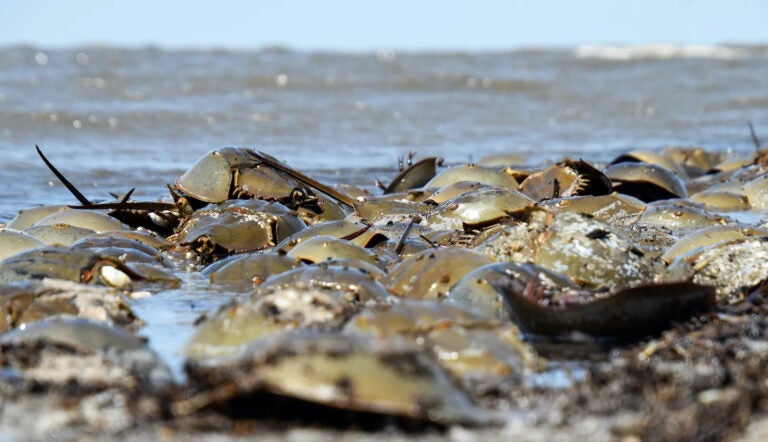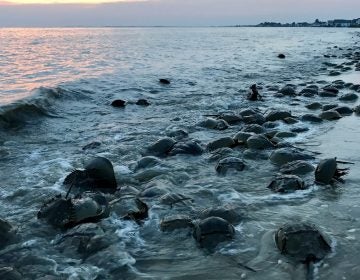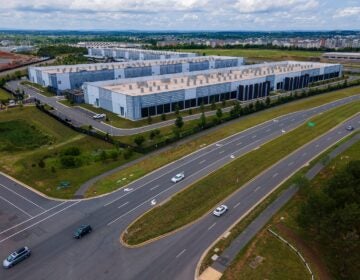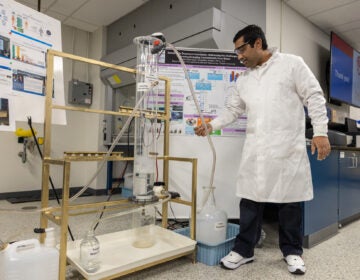Advocates cheer new standards that could save horseshoe crabs from bloodletting
Up to 1 million horseshoe crabs in the U.S. are harvested for biomedical purposes. A synthetic alternative could mean less harvesting of the “living fossils.”
Listen 1:15
Horseshoe crabs, above, may be spared by new standards for the biomedical industry. (Courtesy of Chris Neff/New Jersey Audubon)
From Philly and the Pa. suburbs to South Jersey and Delaware, what would you like WHYY News to cover? Let us know!
Every year, up to 1 million horseshoe crabs in the U.S. are harvested, taken to a lab, stabbed with a needle and bled for biomedical purposes.
Valued around $15,000 per quart, the crustaceans’ bright blue blood responds to bacterial toxins by clotting, which helps determine the virility of vaccines and medical devices. Though the crabs are returned to the ocean, an estimated 15–30% die from the bloodletting.
In an effort to protect the “living fossils,” and the greater ecosystem, conservationists have long advocated for an end to the practice of taking horseshoe crab blood. The crabs’ eggs are a food source for endangered red knot birds, which make a stop on the U.S. coast, including the Delaware Bay, during their 9,000-mile migration from South America to the Arctic.
Horseshoe crabs may be spared in the near future, however. On Friday, the U.S. Pharmacopeia, an organization that sets standards for the biomedical industry, issued guidance on using synthetic chemicals instead of crab blood. New Jersey and Delaware advocates are applauding the measure.
“It makes sense from the biomedical industry. It’s safer, it’s less expensive, and it’s a renewable resource,” said Emily Diznoff, a Delaware family practice physician who has advocated for the species’ protection. “I was thrilled for the horseshoe crabs, hoping that this would finally influence biomedical companies to choose the alternative so that we wouldn’t be putting the horseshoe crabs in such jeopardy like we are right now.”
Horseshoe crabs have existed for more than 400 million years, surviving several mass extinction events. However, their populations drastically reduced in the 1990s, partly because they were over-harvested and used as bait for eels and whelk.
The horseshoe crab’s population decline is bad news for the endangered red knot bird, which relies on the crab’s eggs for sustenance. The U.S. Fish and Wildlife Service reports that red knots declined about 75% from the 1980s to the 2000s, largely because of reduced horseshoe crab eggs.
Though harvesting restrictions have improved horseshoe crab populations, red knot numbers remain critically low, according to some surveys.
“[The U.S. Pharmacopeia’s guidance is] a great additional step towards preserving these ancient mariners and the migratory shorebirds that depend on them,” said Tim Dillingham, executive director for the American Littoral Society, based in New Jersey.
New Jersey has a moratorium on the commercial harvesting of horseshoe crabs for bait, but provides exemptions for blood collection. While Delaware has a permitting process for both, biomedical collection does not currently exist in the state.
Lessening the demand
Last year, the U.S. Pharmacopeia announced a proposal to simplify the use of synthetic alternatives to horseshoe crab blood. Although a synthetic alternative was developed decades ago, U.S. drug companies have faced regulatory hurdles when trying to use it.
Drug maker Eli Lilly has been using a synthetic alternative since 2016, and says it’s more cost-beneficial and effective. The pharmaceutical company was required to get additional approval from the U.S. Food and Drug Administration because the U.S. Pharmacopeia failed to recognize the use of a synthetic.
The guidance issued Friday provides manufacturers information for using two types of synthetic chemicals, but does not ban the biomedical use of horseshoe crab blood.
However, environmentalists and other advocates believe there will be decreased demand.
“I’m very happy U.S. Pharmacopeia has announced they’re adopting these guidelines that would move us towards synthetic alternatives to horseshoe crabs,” said Congressman Frank Pallone, D-New Jersey. “That’s going to make a big difference in terms of trying to make sure the numbers of horseshoe crabs are not decreased, and … this action will go far towards making the case for synthetic alternatives being approved by the FDA for testing protocols.”

Get daily updates from WHYY News!
WHYY is your source for fact-based, in-depth journalism and information. As a nonprofit organization, we rely on financial support from readers like you. Please give today.







